Base class for all numeral systems with a positional notation. More...
#include <ntextp.h>
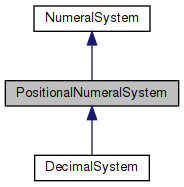
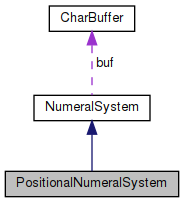
Public Member Functions | |
| PositionalNumeralSystem (unsigned int base, unsigned int digits, const char fractionPoint) | |
| ~PositionalNumeralSystem () | |
| virtual const char * | GetName () |
| virtual const char * | GetPrefix () |
| virtual unsigned int | GetDigits () |
| virtual void | SetDigits (unsigned int digits) |
| virtual const char | GetFractionPoint () |
| virtual void | SetFractionPoint (const char fractionPoint) |
| virtual const char * | GetText (Number *number) |
| virtual Number * | Parse (const char *text, unsigned int *length, char **end) |
 Public Member Functions inherited from NumeralSystem Public Member Functions inherited from NumeralSystem | |
| NumeralSystem () | |
| virtual | ~NumeralSystem () |
| virtual Number * | Parse (const char *text) |
Protected Member Functions | |
| const char * | GetSpecialCase (Number *number) |
| void | IntegerToBuffer (double value, unsigned int digits, int *outdigits) const |
Protected Attributes | |
| double | baseDouble |
| unsigned int | digits |
| char | fractionPoint |
 Protected Attributes inherited from NumeralSystem Protected Attributes inherited from NumeralSystem | |
| CharBuffer * | buf |
Private Member Functions | |
| const char * | GetText (double number) const |
| bool | IsDigit (char *digit) |
Private Attributes | |
| unsigned int | baseInteger |
| char | maxNumeric |
| char | maxAlphaLower |
| char | maxAlphaUpper |
Detailed Description
Base class for all numeral systems with a positional notation.
More info on positional notation is available at Wikipedia: https://wikipedia.org/wiki/Positional_notation
Constructor & Destructor Documentation
◆ PositionalNumeralSystem()
| PositionalNumeralSystem::PositionalNumeralSystem | ( | unsigned int | base, |
| unsigned int | digits, | ||
| const char | fractionPoint | ||
| ) |
Definition at line 40 of file ntextp.cpp.
References baseDouble, baseInteger, digits, fractionPoint, maxAlphaLower, maxAlphaUpper, and maxNumeric.
Referenced by DecimalSystem::DecimalSystem(), Program::NewPositionalInput(), and Program::NewPositionalOutput().

◆ ~PositionalNumeralSystem()
| PositionalNumeralSystem::~PositionalNumeralSystem | ( | ) |
Definition at line 53 of file ntextp.cpp.
Member Function Documentation
◆ GetDigits()
|
virtual |
◆ GetFractionPoint()
|
virtual |
◆ GetName()
|
virtual |
Implements NumeralSystem.
Definition at line 62 of file ntextp.cpp.
References CharBuffer::Append(), baseInteger, NumeralSystem::buf, DecimalSystem::DecimalSystem(), CharBuffer::Empty(), CharBuffer::EnsureSize(), CharBuffer::GetString(), NumeralSystem::GetText(), RealNumber::RealNumber(), and StrLen().
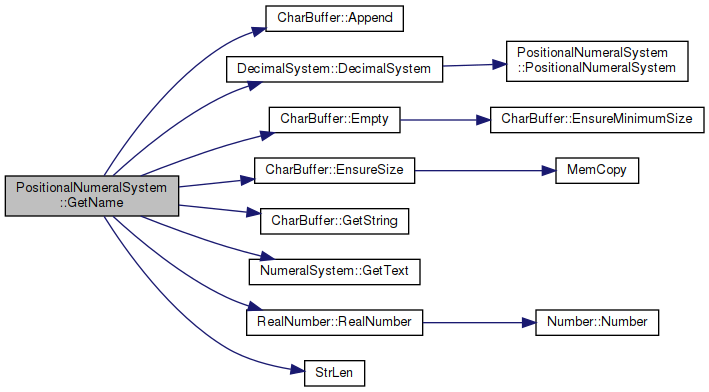
◆ GetPrefix()
|
virtual |
◆ GetSpecialCase()
|
protected |
Definition at line 117 of file ntextp.cpp.
References CharBuffer::Append(), NumeralSystem::buf, CharBuffer::Empty(), CharBuffer::GetString(), Number::IsInfinite(), Number::IsNaN(), Number::IsNegative(), Number::IsNotImplemented(), and Number::IsZero().
Referenced by DecimalSystem::GetText(), and GetText().
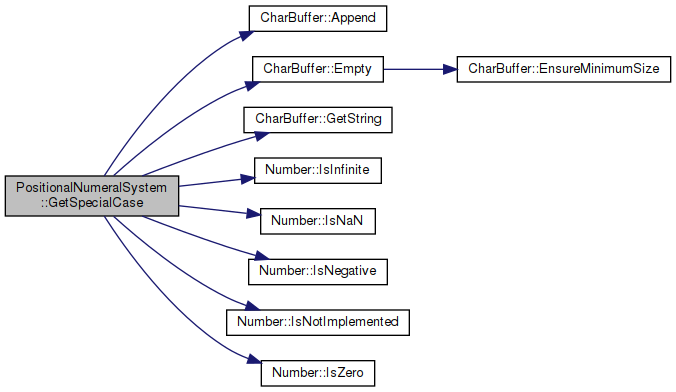

◆ GetText() [1/2]
|
virtual |
Implements NumeralSystem.
Reimplemented in DecimalSystem.
Definition at line 157 of file ntextp.cpp.
References CharBuffer::Append(), NumeralSystem::buf, CharBuffer::CharBuffer(), cimag(), CharBuffer::Copy(), creal(), CharBuffer::Empty(), ComplexNumber::GetComplexValue(), Number::GetRealValue(), GetSpecialCase(), CharBuffer::GetString(), GetText(), nsysreal, and Number::system.
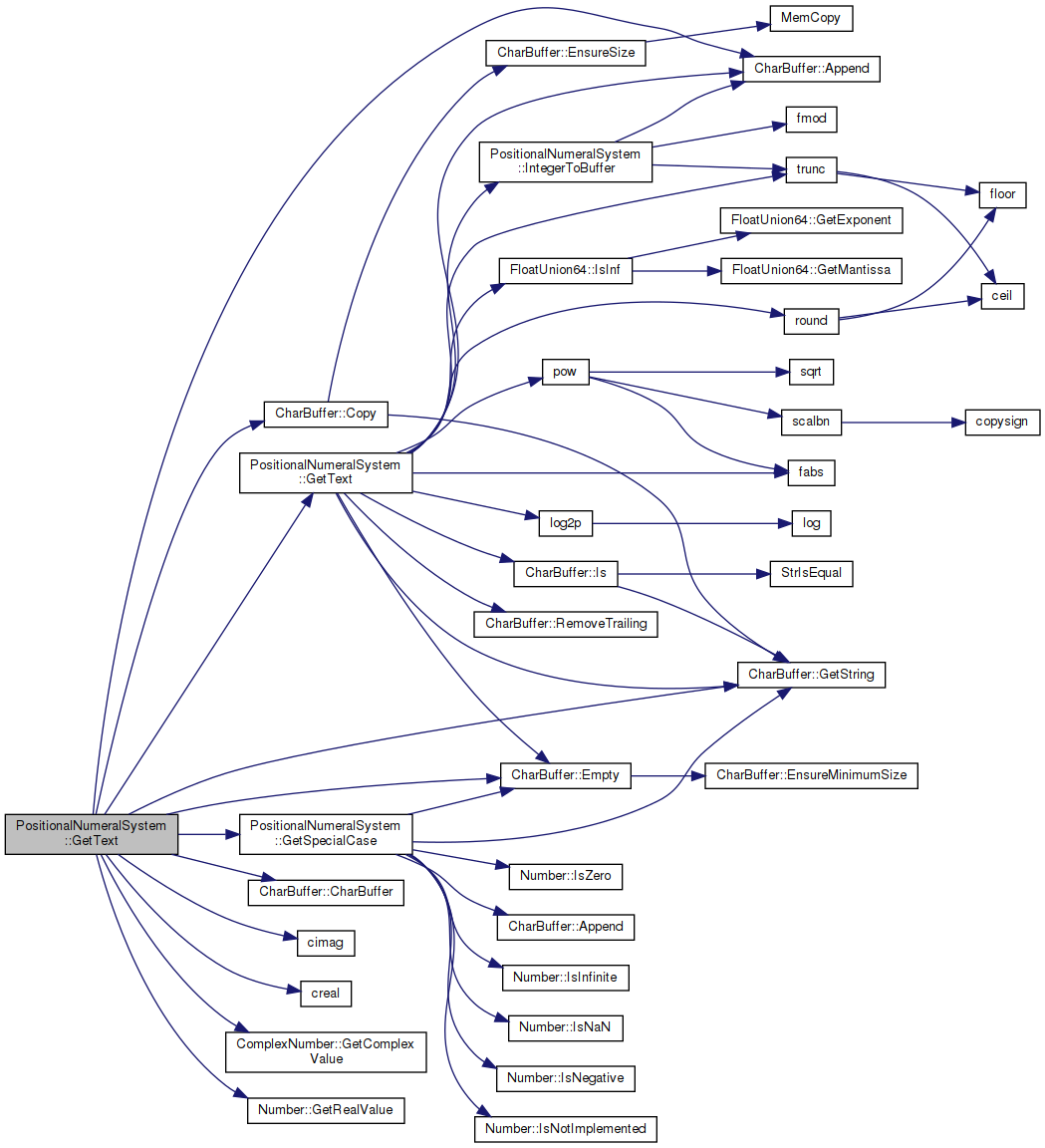
◆ GetText() [2/2]
|
private |
Definition at line 208 of file ntextp.cpp.
References CharBuffer::Append(), baseDouble, NumeralSystem::buf, digits, CharBuffer::Empty(), fabs(), FloatUnion64::floatingPoint, fractionPoint, CharBuffer::GetString(), IntegerToBuffer(), CharBuffer::Is(), FloatUnion64::IsInf(), log2p(), pow(), CharBuffer::RemoveTrailing(), round(), and trunc().
Referenced by GetText().
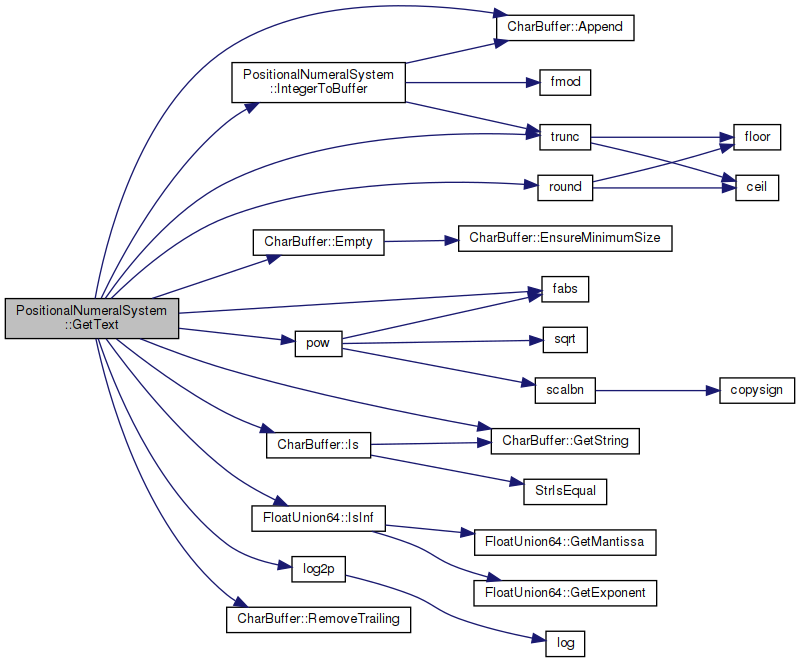

◆ IntegerToBuffer()
|
protected |
Definition at line 316 of file ntextp.cpp.
References CharBuffer::Append(), baseDouble, NumeralSystem::buf, fmod(), and trunc().
Referenced by DecimalSystem::GetText(), and GetText().
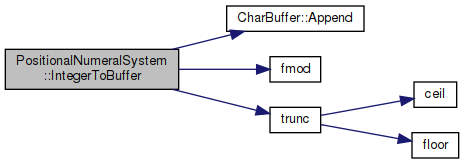

◆ IsDigit()
|
private |
Definition at line 57 of file ntextp.cpp.
◆ Parse()
|
virtual |
Implements NumeralSystem.
Definition at line 350 of file ntextp.cpp.
References baseDouble, fractionPoint, maxAlphaLower, maxAlphaUpper, maxNumeric, pow(), and RealNumber::RealNumber().

◆ SetDigits()
|
virtual |
◆ SetFractionPoint()
|
virtual |
Member Data Documentation
◆ baseDouble
|
protected |
Definition at line 60 of file ntextp.h.
Referenced by GetText(), IntegerToBuffer(), Parse(), and PositionalNumeralSystem().
◆ baseInteger
|
private |
Definition at line 68 of file ntextp.h.
Referenced by GetName(), and PositionalNumeralSystem().
◆ digits
|
protected |
Definition at line 61 of file ntextp.h.
Referenced by GetDigits(), DecimalSystem::GetText(), GetText(), PositionalNumeralSystem(), and SetDigits().
◆ fractionPoint
|
protected |
Definition at line 62 of file ntextp.h.
Referenced by GetFractionPoint(), DecimalSystem::GetText(), GetText(), Parse(), PositionalNumeralSystem(), and SetFractionPoint().
◆ maxAlphaLower
|
private |
Definition at line 70 of file ntextp.h.
Referenced by Parse(), and PositionalNumeralSystem().
◆ maxAlphaUpper
|
private |
Definition at line 71 of file ntextp.h.
Referenced by Parse(), and PositionalNumeralSystem().
◆ maxNumeric
|
private |
Definition at line 69 of file ntextp.h.
Referenced by Parse(), and PositionalNumeralSystem().
The documentation for this class was generated from the following files:
- src/lib/ntextp.h
- src/lib/ntextp.cpp
